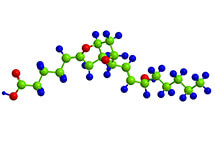Lipid Mediators
Lipid mediators are messenger molecules produced by cells in response to tissue injury. Prostaglandins (PGs) and Leukotrienes (LTs) are biologically active lipid mediators that play important roles in inflammation and are involved in pathological states with an inflammatory component, such as asthma, cardiovascular disease, cancer, etc. They are derived from arachidonic acid, an essential fatty acid, through the action of cyclooxygenases (COXs) and lipoxygenases (LOXs), respectively.
 Molecular structure of ProstacyclinThe diverse and potent biological actions of PGs and LTs onalmost all organs stimulated research on these fascinating molecules over the last five decades. The quintessential properties of “true” eicosanoids are their stereochemical precision in formation and recognition, their potency in the nanomolar range in vitro, and their bona fide biological activities. As a result, these lipid mediators are in great demand for both research, diagnostic and therapeutic purposes. They are extremely difficult to make, and therefore, very expensive (1mg costs ~ $2500). Dr. C. Channa Reddy’s laboratory is the first one to successfully synthesize these compounds in stereo chemical precision using biomimetic method. He has been supplying the entire spectrum of PGs, LTs, and the enzymes associated with their biosynthesis to different companies located in United States. Therefore, Indus Gene is well placed to monopolize the eicosanoid market.
Molecular structure of ProstacyclinThe diverse and potent biological actions of PGs and LTs onalmost all organs stimulated research on these fascinating molecules over the last five decades. The quintessential properties of “true” eicosanoids are their stereochemical precision in formation and recognition, their potency in the nanomolar range in vitro, and their bona fide biological activities. As a result, these lipid mediators are in great demand for both research, diagnostic and therapeutic purposes. They are extremely difficult to make, and therefore, very expensive (1mg costs ~ $2500). Dr. C. Channa Reddy’s laboratory is the first one to successfully synthesize these compounds in stereo chemical precision using biomimetic method. He has been supplying the entire spectrum of PGs, LTs, and the enzymes associated with their biosynthesis to different companies located in United States. Therefore, Indus Gene is well placed to monopolize the eicosanoid market.
| Product | Application |
|---|---|
| Prostaglandins D2/ E2/ F2F2 and others | Child birth, Menstrual regulation, Immunity |
| Prostacyclins | Treatment of cardiovascular diseases |
| Thromboxanes | Treatment of Hypertension/ COX inhibition |
| HPETES and HETEs | Research and Development of drugs |
| Leukotrienes | Research and Development of drugs for allergies and asthma |


